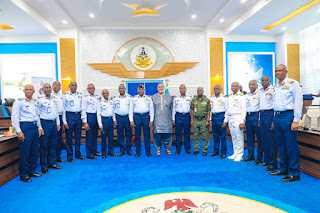
The Nigerian Air Force (NAF) is making significant strides in advancing indigenous military manufacturing capabilities to meet national security demands. This effort is part of the Federal Government’s initiative to develop a robust ecosystem for the production of military equipment and ammunition.
Speaking at the Defence and Services Transformation and Innovation Branches of the Armed Forces of Nigeria (AFN) Seminar, hosted by the NAF, on 3 October 2024, in Abuja, Air Marshal Hassan Abubakar emphasized the need for innovation to address evolving security challenges and highlighted ongoing initiatives aimed at boosting the NAF’s operational capabilities.In his keynote address, the Chief of the Air Staff revealed that the NAF is in the final stages of negotiating a technology transfer agreement with Messrs Zenith Prom of Serbia for the acquisition of 57mm rocket technology.
This agreement is set to significantly enhance Nigeria’s ability to manufacture advanced rocket systems, strengthening the nation’s armament capabilities. Furthermore, the NAF is collaborating with UA Vision of Portugal to fully operationalize the Tsaigumi Unmanned Aerial Vehicle (UAV) within Nigeria.
Deputy Director Public Relations and Information, Group Captain Kabiru Ali noted that this partnership is expected to provide a crucial boost to the NAF’s surveillance and reconnaissance capabilities, enabling more effective monitoring of national airspace.
Air Marshal Abubakar also outlined several Research & Development (R&D) projects nearing operationalization, including the Ultra-sonic Solar Bird Scare Cannon Device, designed to protect vital installations, and the Rapid Response Operation Geo-Coordination Device, which will improve field communication and coordination.
Additionally, the NAF is developing the Tactical Mobile Combat Smart Helmet, an advanced protective gear designed to enhance situational awareness in combat, and is moving towards local production of General-Purpose Machine-Gun ammunition links and 250kg bomb impact fuses.
The CAS reiterated that these advancements are a testament to NAF’s commitment to self-reliance in defense production and innovation, ensuring that the Nigerian military remains agile and capable in modern warfare.
The Chief of Transformation and Innovation, Air Vice Marshal Adeniyi Amesinlola, while delivering his welcome address, reaffirmed the NAF Transformation and Innovation Branch’s commitment to advancing the Chief of Air Staff’s command philosophy, which aims to transform the Nigerian Air Force into an agile and adaptable force capable of addressing today’s security challenges.
He highlighted that the branch is not only focused on developing cutting-edge technologies and modernizing operational processes, but also on fostering a culture of innovation across all levels of the Air Force. He also outlined several key initiatives currently underway, including the implementation of digital solutions to enhance efficiency and the development of indigenous military hardware. According to him, the Transformation and Innovation Branch is committed to ensuring that these advancements are aligned with the strategic objectives of the NAF, ultimately contributing to the broader goal of safeguarding national security.The Defence Headquarters and Services Transformation and Innovation Branches of the Armed Forces of AFN convene quarterly to review the progress of ongoing transformation initiatives within the Nigerian military. Hosting responsibilities for these meetings rotate between the Defence Headquarters and the three Services. The NAF hosted Third Quarter edition of the seminar which is often a 2-day event.On the first day, Dr. Abdul-Hakeem Ajijola, an internationally recognized expert in cybersecurity, policy development, and emerging technologies with over 30 years of experience, delivered a lecture on “Emerging Technologies in Warfare.”
His insights focused on the role of advanced technologies in modern warfare and their implications for the Nigerian military’s strategic development. While the second day of the seminar provided opportunities for participants to brainstorm on issues key to transforming the AFN and adapt it to meet current challenges.